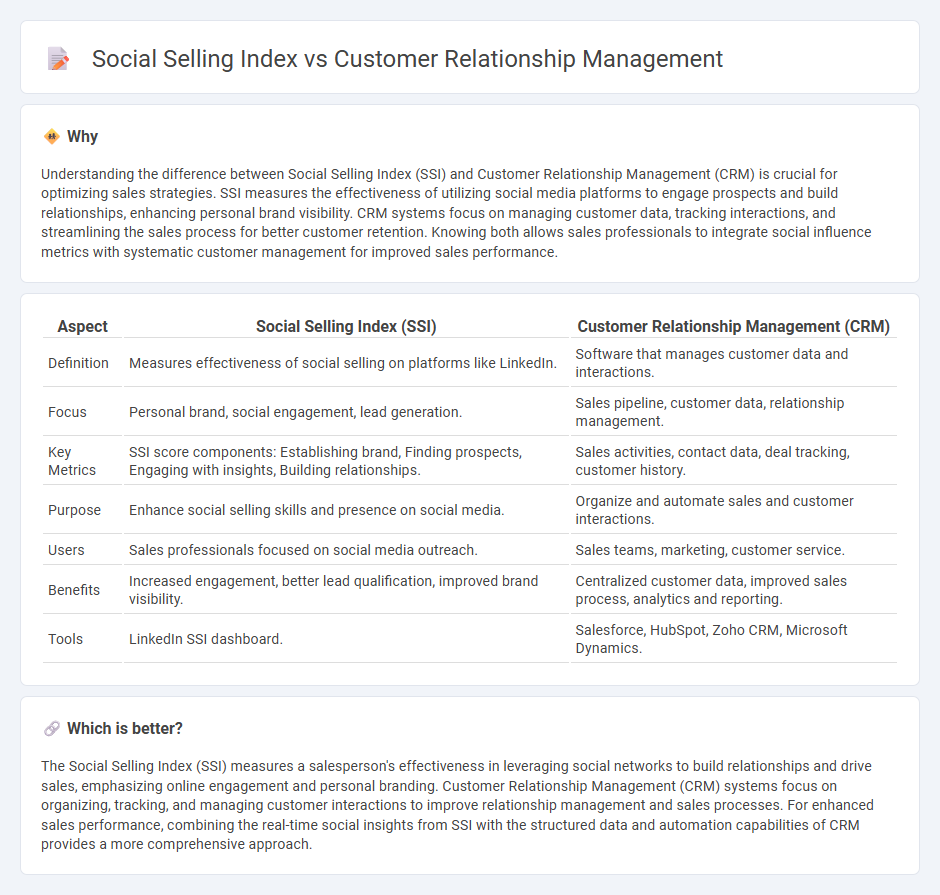
The Social Selling Index (SSI) measures a salesperson's effectiveness in leveraging social media platforms to engage prospects and build professional relationships, while Customer Relationship Management (CRM) systems focus on organizing and managing detailed customer data and interactions to enhance sales processes. Both tools are essential for modern sales strategies, combining social engagement metrics with structured customer insights. Explore how integrating SSI with CRM can transform your sales approach and drive higher conversion rates.
Why it is important
Understanding the difference between Social Selling Index (SSI) and Customer Relationship Management (CRM) is crucial for optimizing sales strategies. SSI measures the effectiveness of utilizing social media platforms to engage prospects and build relationships, enhancing personal brand visibility. CRM systems focus on managing customer data, tracking interactions, and streamlining the sales process for better customer retention. Knowing both allows sales professionals to integrate social influence metrics with systematic customer management for improved sales performance.
Comparison Table
| Aspect | Social Selling Index (SSI) | Customer Relationship Management (CRM) |
|---|---|---|
| Definition | Measures effectiveness of social selling on platforms like LinkedIn. | Software that manages customer data and interactions. |
| Focus | Personal brand, social engagement, lead generation. | Sales pipeline, customer data, relationship management. |
| Key Metrics | SSI score components: Establishing brand, Finding prospects, Engaging with insights, Building relationships. | Sales activities, contact data, deal tracking, customer history. |
| Purpose | Enhance social selling skills and presence on social media. | Organize and automate sales and customer interactions. |
| Users | Sales professionals focused on social media outreach. | Sales teams, marketing, customer service. |
| Benefits | Increased engagement, better lead qualification, improved brand visibility. | Centralized customer data, improved sales process, analytics and reporting. |
| Tools | LinkedIn SSI dashboard. | Salesforce, HubSpot, Zoho CRM, Microsoft Dynamics. |
Which is better?
The Social Selling Index (SSI) measures a salesperson's effectiveness in leveraging social networks to build relationships and drive sales, emphasizing online engagement and personal branding. Customer Relationship Management (CRM) systems focus on organizing, tracking, and managing customer interactions to improve relationship management and sales processes. For enhanced sales performance, combining the real-time social insights from SSI with the structured data and automation capabilities of CRM provides a more comprehensive approach.
Connection
The Social Selling Index (SSI) measures a salesperson's effectiveness in leveraging social media platforms to engage prospects and build trust, directly impacting customer relationship management (CRM) strategies. Higher SSI scores correlate with improved CRM outcomes as sales professionals use social insights to personalize communication and nurture client relationships. Integrating SSI metrics with CRM systems enhances data-driven decision-making, driving sales growth and customer satisfaction.
Key Terms
Customer Relationship Management (CRM):
Customer Relationship Management (CRM) systems streamline sales processes by centralizing customer data, enabling personalized communication, and enhancing customer retention through data-driven insights. Unlike the Social Selling Index (SSI), which measures social media effectiveness in building a professional brand, CRM tools focus on managing comprehensive customer interactions across multiple channels to improve sales and service efficiency. Explore more to understand how integrating CRM with social selling strategies can optimize your customer engagement and boost revenue growth.
Lead Tracking
Customer Relationship Management (CRM) systems excel in lead tracking by organizing and managing customer data to streamline sales processes and improve follow-up efficiency. The Social Selling Index (SSI) measures a salesperson's effectiveness in leveraging social networks to generate and nurture leads, focusing on relationship-building and engagement metrics. Explore the differences in how CRM and SSI approach lead tracking to enhance your sales strategy.
Customer Segmentation
Customer segmentation in Customer Relationship Management (CRM) involves categorizing customers based on demographics, behaviors, and purchasing patterns to tailor marketing strategies effectively. The Social Selling Index (SSI) measures how well professionals engage with their network by sharing relevant content, building relationships, and establishing a strong personal brand on platforms like LinkedIn. Explore how integrating CRM-driven segmentation with SSI insights can enhance targeted social selling strategies for better customer engagement.
Source and External Links
What is Customer Relationship Management (CRM)? - Talkdesk - CRM is a proactive approach to managing customer data, communication, and support across all stages of the customer lifecycle to transform buyers into long-term brand advocates by delivering personalized, multichannel support.
What is CRM (Customer Relationship Management)? - TechTarget - CRM combines practices, strategies, and technologies to manage and analyze customer interactions and data to improve service, boost retention, and drive sales by consolidating data from multiple customer touchpoints.
What Is CRM? | IBM - CRM is an integrated technology suite used to document, track, and optimize an organization's interactions with customers, supporting sales, lead management, customer service, and marketing efforts to improve retention and experience.
 dowidth.com
dowidth.com